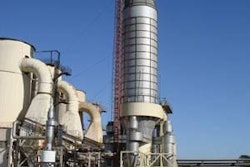Look for new Cargill subsidiary Emerald Renewable Energy LLC to begin development of four 100-million-gallon-per-year ethanol plants in the Midwestern United States, according to a recent company announcement.
Emerald Renewable Energy, which is reportedly considering several potential sites, is a privately held, limited liability company (LLC) formed by Cargill to develop and invest in renewable energy projects in the United States. Cargill will provide the initial development capital for the projects. Emerald Renewable Energy will contract with Cargill for services to support the facilities, including corn supply, natural gas, price risk management and the marketing of ethanol and distillers grains.
Scott Portnoy, Cargill corporate vice president with responsibility for its Biofuels and Bioproducts businesses, says the LLC will benefit from access to Cargill's long-held global expertise in trading, sourcing corn, plant construction and operations, risk management and bulk commodity transportation.
According to company sources, Emerald Renewable Energy has reached agreement with a globally recognised engineering permitting and construction (EPC) contractor to design and construct their facilities. To finance the debt capital for the construction of the plants, Emerald has nominated BNP Paribas as lead arranger and Santander Investment and Standard Chartered as senior co-lead arrangers.
Each plant is expected to use nearly 40 million bushels of corn annually to produce 100 million gallons of ethanol and over 300,000 tonnes of dry distillers grains for animal feed each year.
Worldwide increased production of biofuels already has environmentalists concerned about devastations to the world's natural resources to feed the biofuel boom, triggering global debates over food versus fuel positions, and the true "green cost" of producing "green energy." With U.S. corn ethanol production increasing, it's expected that other exporters, such as Brazil and Argentina, will have to supply more corn to the world market as world meat demand rises, raising additional concerns that environmentally sensitive lands may be cleared for agriculture production.
United States Department of Agriculture Chief Economist Keith Collins addressed key ethanol-related issues in a statement before the U.S. Senate Committee on Environment and Public Works on 6 September. He told the committee that corn prices could set new record highs over the next five to six years and that the U.S. will need substantial increases in corn acreage to prevent exports from declining and livestock profitability from falling, pointing to the Conservation Reserve Program (CRP), which has 36 million acres set aside from crop production for environmental reasons, as a potential source of additional crop acreage. That solution is not without controversy.
Mr. Collins also predicted that ethanol plants will likely continue to operate even if corn prices rise well above historical record highs and that plants will be able to bid corn away from a variety of other uses over a wide range of corn prices. The corn sector will be highly vulnerable to market disruptions ethanol plants and other users will be operating in a much riskier environment than we have today, Mr. Collins told the committee. He also told Senate committee members that corn alone cannot meet the U.S. demand for biofuels and that cellulosic ethanol production appears to be the best renewable alternative for reducing crude oil imports.
Other countries are either producing and using ethanol in large quantities or are providing incentives to expand ethanol production and use with some at or approaching self-sufficiency in meeting energy needs.
Brazil and Sweden are among the countries using large quantities of ethanol as fuel. Prompted by the increase in oil prices in the 1970s, Brazil introduced a programme to produce ethanol for use in automobiles in an effort to reduce dependency on oil imports. The Brazilian ethanol is derived primarily from sugar cane. Approximately 40 percent of autos in Brazil are routinely using 100 percent pure ethanol for fuel. Those not using pure ethanol are using blends of 24 percent ethanol. Brazil consumes about 4 billion gallons of ethanol annually and exports ethanol to other countries.
Sweden is also no stranger to ethanol, having used it in chemical production for years. Since 1980, Sweden has managed to cut its crude oil consumption about in half while still seeing an increase in the use of gasoline and diesel for transportation. Ethanol-blended gasoline and ethanol-blended diesel are being considered as viable alternatives to further lower emission levels.
India is in the process of initiating the use of ethanol for the purposes of automotive fuel. A movement has already been initiated by distilleries in India to use surplus alcohol as a blending agent or an oxygenate in gasoline. Based on experiments by the Indian Institute of Petroleum, a 10 percent ethanol blend with gasoline and a 15 percent ethanol blend with diesel are being considered for use in vehicles in at least one state.
As production continues to grow worldwide, the debate over fuel versus food must surely evolve into one of solutions, including answers for consistency, quality and handling of DDGS and other feed issues.
Mycotoxin webinar recording available
If you missed the 16 January free online seminar, "Mycotoxins: What You Don't Prevent, You Can Still Manage," a recording is now available.
Mycotoxins in the world's feed and food supply are on the rise, causing increased scrutiny and contamination problems. Managing and preventing the effects of mould contamination and mycotoxin production are most important.
This webinar was presented by Feed Management, Poultry International and Feed International magazines and sponsored by Promote. Hear Dr. George Rottinghaus, a renowned University of Missouri, USA, toxicologist, and Dr. Gerardo Morantes, a Cargill field nutritionist heavily experienced in global feed, dairy, swine and poultry, discuss the latest discoveries and advances in controlling mycotoxins.
To view the webinar, go to the following web address:http://www.wattnet.com/websem/home.htm.
.jpg?auto=format%2Ccompress&crop=faces&fit=crop&h=48&q=70&w=48)




.jpg?auto=format%2Ccompress&fit=crop&h=167&q=70&w=250)











